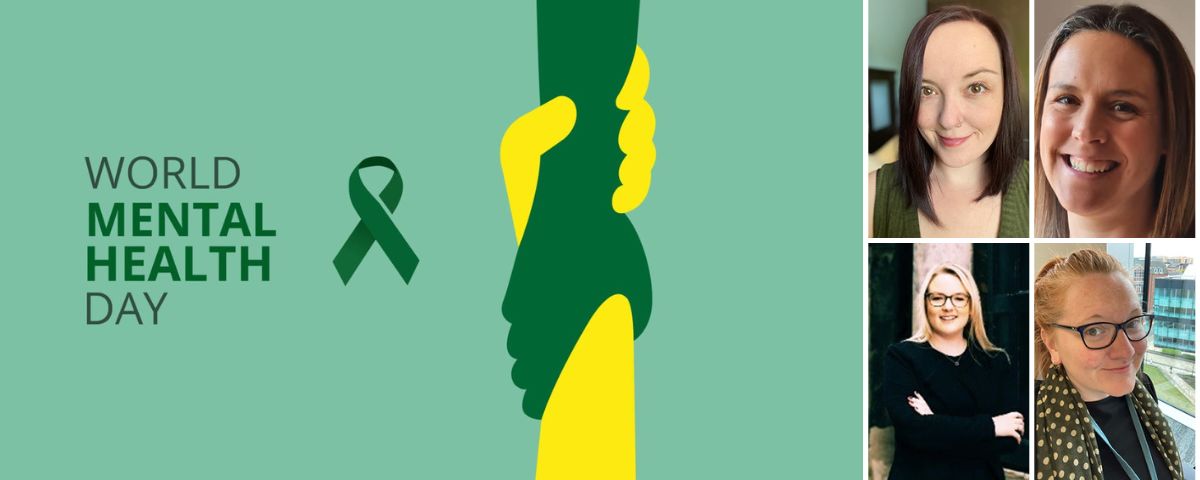
Today’s world is a fast moving and ever changing arena, where juggling multiple tasks and responsibilities is commonplace and many of us can find ourselves struggling at times..
We have put in place a system of support and care for all our colleagues should they need it by appointing trained mental health first aiders who are available to discuss all area that may be affecting employees’ mental health be that in the work environment or personal lives.
For World Mental Health Day we spoke to Hayley, Helen, Rosie and Sarah who are 4 of our mental health first aiders to get some insight into how they can help and support our staff.
What does mental health awareness mean to you?
Hayley: Encouraging people to recognise, discuss and improve mental health for themselves and the people around them. Showing them that it is not something to be ashamed of and that there are so many accessible resources that can help them.
Helen: A knowledge and understanding that mental health is equally as important as physical health and needs the same care and attention
Rosie: To me it means paying attention and being aware of our own emotions and behaviours, as well as being aware of others. Just as we would be aware if someone had a broken leg and needed a little longer to walk to a meeting room than others.
Sarah: Mental health awareness means that you are aware that others (or yourself) may be struggling, understanding that people cope differently with things and that you never truly know what someone is going through. Mental health is just as important as physical health, and they can be so intertwined. Being aware of mental health allows you to better understand all the shades of a person and/or a situation rather than the black and white and allows you to offer meaningful support.
What is your number one tip for improving one’s mental health?
Hayley: Check in with yourself regularly. Have a quiet moment and ask yourself “How am I feeling today?” and acknowledge that even if the answer is “I’m not doing well” that is okay. We often try to push aside the negative emotions but that only makes them stronger. Acknowledging them and taking some time to breathe deeply and check in can just help to calm yourself down and provide clarity so you are able to look at how best to move forward (e.g. deciding that you would benefit from a chat with a friend/colleague/family member/professional or just a quick 10 minute walk in the fresh air).
Helen: Spend some time each day doing something you enjoy – whether it’s for a few minutes or a few hours.
Rosie: Reframe unhelpful thoughts. We often tell ourselves stories that have no factual evidence to support them. The awareness that this is something we might be doing is key to them changing our own behaviors. Perhaps ask yourself some of the following questions:
- Am I thinking that I can predict the future?
- Am I assuming I know what others are thinking? What’s the evidence?
- Am I doing that ‘compare and despair’ thing (Seeing only the good and positive aspects of others and getting upset when comparing ourselves negatively against them).
- What would be a more balanced and helpful way of looking at it?
- Ok, thinking that the worst possible thing will definitely happen isn’t really helpful right now. What’s most likely to happen?
Sarah: Find your thing, something that puts you in a zone where you can focus on you, or leave your worries aside for a little while to give yourself a break. For some that’s exercise or a 1000 piece jigsaw, others reading or meditation. I’m a big fan of being outside when things get too much, a brisk walk, by the sea is my favourite, shouting into the waves when you feel you need to let off steam is the best!
Why did you put your name forward to be a mental health first aider?
Hayley: I have been able to overcome many difficult personal/health situations over the years with the help of professionals. I would not be where I am today without seeking that guidance. I have been introduced to various different mindfulness techniques and behavior therapies via counselling sessions and now feel more in control of my own mental health. I am better at recognising when I am struggling and knowing what steps to take to get back on track. I feel it is extremely important to pass that knowledge on to other people and gently guide them to be able to empower themselves too. It can feel like such a huge step to take so I felt it would be beneficial for people to be able to talk to someone who has actively engaged with these support systems and continues to do so.
Helen: I have experience of mental health issues and how isolating it can be. Its important to know that there is someone you can turn to who will listen but not judge and offer guidance and support.
Rosie: Honestly, for me it is simple, I want people to know that they are never alone and that there is always support available. Ralph Waldo Emerson has a quote that resonates with me, the end of the quote sums up my thoughts – ‘to know even one life has breathed easier because you have lived, this is to have succeeded.’
Sarah: It is so important to me to be as equipped as I can be, both in work and in my personal life, to support someone who is experiencing mental health struggles. There’s still so much stigma and misunderstanding surrounding mental health yet it affects so many, with better understanding and support more people can seek the help they need.
If you would like to know more about managing your mental health, find out more at: Mental health – NHS (www.nhs.uk)